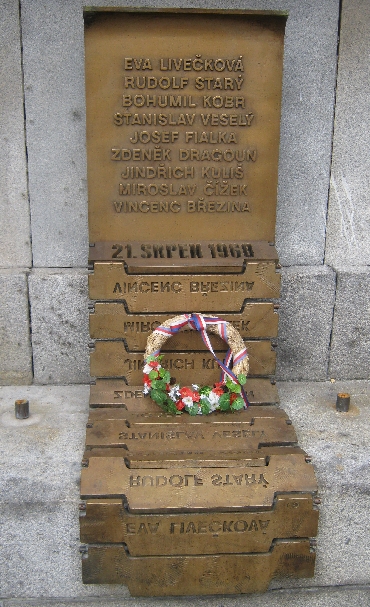
I hope my regular readers will forgive me for tackling a current political issue. However, as Ukraine is almost on the doorstep of the Czech Republic, I thought it appropriate to reflect on how the current crisis is seen here, and the impact the crisis may have in the near future.
Before proceeding any further, I should point out that it is not quite as close as one American TV news channel tried to illustrate. MSNBC successfully reinvented Czechoslovakia, a country that ceased to exist on 31st December 1992, and showed it as bordering Ukraine as can be seen in this link. Just to confirm, whilst Slovakia does border Ukraine, the Czech Republic does not.
What may surprise many people is the fact that Ukrainians are by far the largest group of immigrants by nationality, living and working in the Czech Republic. According to the 2011 census, there were 118,000 Ukrainians resident here. The same census also registered 36,000 Russians as being present in the Czech Republic. However, there is quite a contrast in what each nationality group does here.
Most Ukrainians do what many relatively newly arrived immigrants do in so many countries around the world. They do the jobs that the host countries own citizens don’t want to do. In the Czech Republic this means that they work as building labourers, street cleaners or washing up and cleaning in bar-restaurants. Often they send home some of the money they earn, to support their families living back in Ukraine.
In contrast, most Russians living here are quite wealthy. As I’ve written previously, they are mainly responsible for parts of the more seedy side of life here such as Herna (gambling) Bars and prostitution. Of course there are Russians living in the Czech Republic, whose main purpose in being here is just to keep well clear of Putin. Inevitably, all Russians get tarred with the same brush, especially during this current crisis.
There is a general, considerable Czech dislike of Russians, because of past history. Czechs quite rightly, see little difference between the former communist-led USSR and present day Putin-led Russia. Both are seen as wanting to dominate and control the neighbouring states of Central and Eastern Europe, either by military or economic means – often a combination of both.
The current situation in the Crimea peninsula, has many echoes of the events of August 1968 here in the Czech Republic. By the will of the people, there is a change of government to one that is not to the liking of Moscow. So the troops are sent in to seek to reimpose Russian control and influence. In 1968, certain members of the Central Committee of the Czechoslovak Communist Party are supposed to have invited the Soviet Red Army to invade the country. In 2014, Putin’s government claim that former President Viktor Yanukovych, invited Russian troops to intervene in Ukraine, before he was deposed.
There are also wider historical echoes to the origins of the Second World War, with lands that are part of the present-day Czech Republic, being central to the dispute that eventually led to the outbreak of hostilities. As I’ve previously written, when the new nation of Czechoslovakia was established in 1918, the country included many people of German ethnic origin. According to a census taken in 1921, just over three million Germans lived in Czechoslovakia accounting for around 23% of the country’s total population. The areas where Germans formed a majority were known as Sudetenland and the people themselves as the Sudetendeutsche.
During the 1930s, Nazi Germany, led by Adolf Hitler, actively encouraged dissent among the Sudetendeutsche, hoping to provoke a reaction from the Czechoslovak authorities. The aim was to provide justification for military intervention, ostensibly to protect ethnic Germans. This is exactly what Putin-led Russia is doing presently in the Crimea peninsula. Putin claims he is only protecting ethnic Russians but at the same time, he is actively encouraging confrontation with Ukrainians, hoping to provide justification for his actions.
Hitler got his way without needing to forcibly invade. Because of the policy of appeasement adopted in Munich at the end of September 1938, by Neville Chamberlain and his French counterpart Édouard Daladier, Nazi Germany took control of the Sudetenland, without needing to fire a shot. To most Czech people and to me, the parallels are very apparent. Allowing a Putin-led Russia, to take control of the Crimea peninsula because it has a majority ethnic Russian population, will not solve the problem. Instead, it will embolden Putin, to seek to take control of further territory, with the ultimate goal of effectively re-establishing the USSR as an enlarged Russian Federation.
Whilst I thoroughly disapprove of the actions of President Putin, Western leaders, particularly those of the USA and the UK, have a serious problem. When either President Obama or Prime Minister Cameron, point out that Russia has invaded a sovereign country in breach of international law, Putin responds by pointing out that the USA and the UK did exactly the same thing, when they invaded Iraq in 2003. Neither side can claim to hold the moral high ground.
So far, both the United States and the European Union, have adopted a series of economic measures to try and force a change in Russian policy. Fortunately, the weather is helping them. The main economic lever the Russians have, is that much of Central and Eastern Europe relies on Russian natural gas and oil, for heating. But because of the most mild winter of recent memory, stockpiles are high and the winter is coming to an end. With the Russian rouble at an all time low, Putin may be forced to make concessions to keep Russia economically afloat. We shall see. All one can be certain of is that a period of great uncertainty lies ahead.

